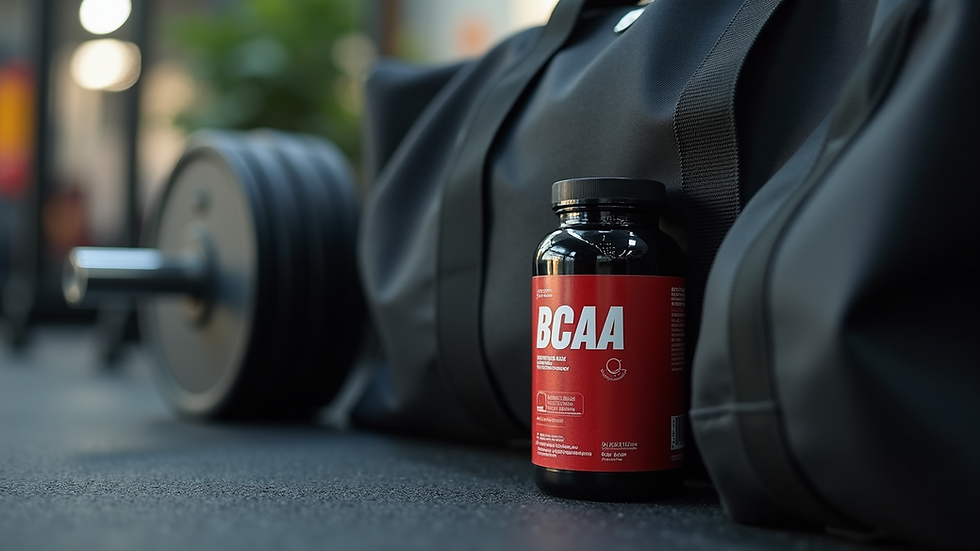BCAAs Benefits: Understanding the Role of BCAAs in Recovery and Performance
- MT
- Sep 12, 2025
- 3 min read
Updated: Dec 18, 2025
Branched-Chain Amino Acids (BCAAs) are one of the most popular fitness supplements among athletes, gym-goers, and health-conscious individuals. Known for supporting muscle recovery, workout performance, and reducing fatigue, BCAAs have earned a reputation as a go-to supplement for strength training, endurance, and bodybuilding. This guide explores what BCAAs are, their benefits, and how to use them effectively to boost your fitness and recovery goals.
What Are BCAAs and Why Are They Important?
BCAAs are made up of three essential amino acids: leucine, isoleucine, and valine. Unlike other amino acids, which are metabolized in the liver, BCAAs are metabolized directly in the muscles. This makes them an immediate energy source during workouts and crucial for post-workout muscle repair.
Leucine – vital for muscle protein synthesis and muscle growth.
Isoleucine – supports energy metabolism and immune function.
Valine – aids in tissue repair and muscle endurance.
Because the body cannot produce these amino acids, they must be obtained through diet or supplements. High-protein foods like chicken, fish, eggs, and legumes are natural sources. However, athletes or those with strict diets often rely on BCAA powders, capsules, or drinks for convenience.

Benefits of BCAAs for Recovery and Performance
1. Muscle Recovery and Reduced Soreness
BCAAs can help reduce muscle soreness after high-intensity workouts. By repairing micro-tears in muscle fibers, they minimize delayed onset muscle soreness (DOMS), allowing faster recovery between sessions.
2. Muscle Protein Synthesis & Growth
Leucine activates the mTOR pathway, triggering protein synthesis that builds and repairs muscles. This is especially valuable for those on a calorie deficit or cutting phase, where muscle preservation is key.
3. Improved Exercise Performance
By reducing serotonin production in the brain, BCAAs help delay fatigue and boost endurance performance. This makes them popular among runners, cyclists, and athletes in prolonged training.
4. Prevention of Muscle Breakdown
During intense exercise or dieting, the body may break down muscle for fuel. BCAA supplementation provides an anti-catabolic effect, preserving lean mass.
For those interested in exploring the advantages of bcaa, these benefits make them a valuable addition to a fitness regimen.

Should You Take BCAAs Every Day?
Daily BCAA intake depends on your fitness level, diet, and training intensity:
Daily Use Makes Sense If:
You train multiple times per week with strength or HIIT workouts.
You follow a calorie-restricted diet and want to protect muscle mass.
You’re on a vegan or vegetarian diet that may lack sufficient amino acids.
You May Not Need Daily BCAAs If:
You already consume plenty of protein-rich foods.
Your workouts are light or low-intensity.
How to Take BCAAs
Timing: Before, during, or after workouts for maximum benefits.
Dosage: Typically 5–10 grams per serving. Always follow label instructions.
Forms: Available as BCAA powder, ready-to-drink formulas, or capsules.

How to Incorporate BCAAs Into Your Fitness Routine
To get the most out of BCAAs, consider these practical tips:
Pair with Protein Intake: BCAAs work best when combined with adequate protein consumption throughout the day.
Stay Hydrated: Drinking plenty of water helps your body absorb and utilize amino acids effectively.
Combine with Balanced Nutrition: BCAAs are supplements, not replacements for a healthy diet rich in whole foods.
Monitor Your Response: Track how your body feels and performs with BCAA supplementation and adjust accordingly.
Potential Side Effects and Considerations
BCAAs are generally safe, but excessive use may cause mild side effects like nausea or fatigue. To stay safe:
Avoid exceeding recommended dosages.
Consult a doctor if you have health conditions or are pregnant.
Choose high-quality BCAA supplements from trusted brands.
Maximizing Your Recovery and Performance with BCAAs
Incorporating BCAAs into your fitness plan can be a game-changer for recovery and performance. By supporting muscle repair, reducing fatigue, and enhancing protein synthesis, BCAAs help you train harder and recover faster. Remember to balance supplementation with a nutritious diet and consistent exercise for the best results.
For those looking to explore the advantages of bcaa further, consider trying different forms such as powders, capsules, or ready-to-drink formulas to find what suits your lifestyle best.
By understanding the role of BCAAs and how to use them effectively, you can take a confident step toward achieving your fitness goals.




Comments